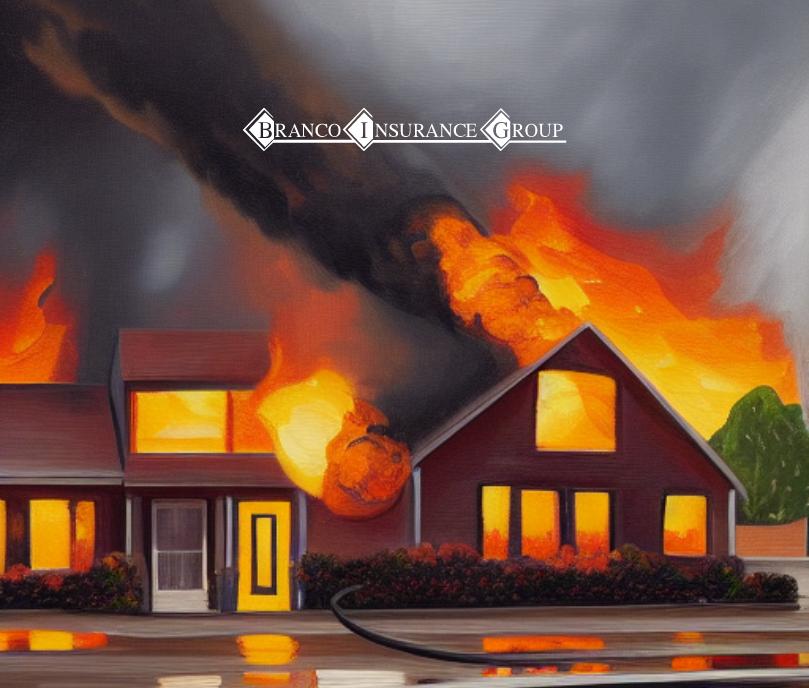
The Vital Role of Annual Visits for Seniors on Medicare
As we age, prioritizing our health becomes increasingly crucial. For seniors enrolled in Medicare, annual visits hold immense significance in maintaining well-being and detecting health

If you’re a homeowner, you know that fire insurance coverage is a must. But what exactly does fire insurance cover? And how much do you need? In this blog post, we’ll answer those questions and more, so that you can be sure you’re appropriately protected in the event of a fire.
A standard fire insurance policy will cover the cost of repairing or rebuilding your home and any personal belongings damaged or destroyed in a fire. Most policies also provide some level of coverage for temporary living expenses if your home is uninhabitable due to fire damage.
Your insurer will most likely recommend that you purchase a policy that covers at least 80% of the replacement value of your home. However, keep in mind that the value of your personal belongings may exceed your policy’s coverage limit. For this reason, it’s a good idea to conduct a home inventory (taking photos or videos of your belongings) so that you have an accurate record of everything you own and can ensure you have sufficient coverage.
The two main factors that affect the cost of fire insurance are the value of your home and possessions and the amount of coverage you need. The location also plays a role; homes in areas with high crime rates or high risk of wildfires will typically cost more to insure than homes in safer areas.
If you’re a homeowner, you know a lot goes into keeping your home safe and protected. From protecting your home from burglars to ensuring that your HVAC system is up to par, there’s a lot to think about. However, one thing that’s often overlooked is fire insurance.
Fire insurance is a type of property insurance that covers damage caused by fires. While most homeowner’s insurance policies cover some fire damage, it’s essential to have coverage that protects explicitly against fires, as this type of damage can be exceptionally costly to repair.
As we mentioned above, fire insurance is a type of property insurance that helps to cover the cost of repairing damage caused by fires. Most standard homeowner’s insurance policies will offer some protection against fire damage, but it’s crucial to have fire insurance specifically to make sure that you’re fully covered.
One of the reasons why fire insurance is so essential is because fires can cause a lot of damage very quickly. A small house fire can cause tens of thousands of dollars in damage in just a few minutes. And if the fire spreads to other homes or businesses nearby, those repair costs can quickly add up.
Another reason why you need fire insurance is that fires can be very unpredictable. Even if you take all of the necessary precautions—such as having working smoke detectors and regularly clearing out your gutters—there’s always a chance that a fire could break out in your home. And if it does, you want to ensure that you have the financial resources available to repair the damage as quickly as possible so you can get back to living your life.
The amount of fire insurance you need will depend on many factors, such as the value of your home and the amount of coverage offered by your standard homeowner’s insurance policy.
Of course, the best way to determine how much coverage you need is to speak with an experienced independent insurance agent who can help you assess your risks and find the right policy for your needs.
Homeowners need to purchase fire insurance for their homes to protect against loss from fire damage. Different types of fire insurance policies are available, and choosing the right policy for your needs is vital. The following is a brief overview of the different types of fire insurance policies available.
The Three Basic Types Of Fire Insurance Policies
1. Peril-Specific Policies: Peril-specific policies cover losses from a specific type of peril, such as fire, wind, or hail damage. This type of policy typically has a lower premium than all-risk policies, but it will not cover losses from perils other than those specified in the policy.
2. All-Risk Policies: All-risk policies cover losses from all perils except those expressly excluded in the policy. This type of policy typically has a higher premium than peril-specific policies but provides comprehensive coverage.
3. Named Peril Policies: Named peril policies are similar to all-risk policies but only cover losses from the perils specifically named in the policy. This type of policy usually has a lower premium than all-risk policies but does not provide comprehensive coverage.
Types Of Insurance Coverage
4. Replacement Cost Coverage: Replacement cost coverage pays to repair or replace damaged property with property of similar kind and quality without depreciation deduction.
5. Actual Cash Value Coverage: Actual cash value coverage pays to repair or replace damaged property after the deductible, with a depreciation deduction. This is the most common type of coverage found in standard homeowner’s insurance policies.
6. Functional Replacement Cost Coverage: Functional replacement cost coverage pays to replace damaged property with property that will perform the same function as the lost or damaged property, even if it is not identical in kind and quality. This type of coverage is usually less expensive than replacement cost coverage but more expensive than actual cash value coverage.
Homeowners need to purchase fire insurance for their homes to protect against loss from fire damage. Different types of fire insurance policies are available, and it is crucial to choose the right one for your needs. The following is a brief overview of the different types of fire insurance policies available. Be sure to carefully read your homeowner’s insurance policy to understand what types of losses are covered and what exclusions apply. If you have any questions, be sure to ask your insurance agent or company representative for clarification.
If you’re a homeowner, you know that one of the most important things you can do is ensure your home is properly protected. That’s why it’s so important to have a good fire insurance policy in place. But with so many different policies on the market, how do you know which one is right for you? Here are a few tips to help you choose the right fire insurance policy for your needs.
One of the first things you need to do when shopping for fire insurance is to know what coverage you need. This will depend on several factors, including the value of your home and belongings and your personal needs and preferences. Once you know how much coverage you need, you can start shopping around for policies that will suit your needs.
Once you know how much coverage you need, it’s time to start shopping around for policies. Be sure to compare both the coverage and the prices of different policies before making a decision. Don’t just go with the first policy you find – take the time to compare multiple options before making a final decision.
Before signing on the dotted line, be sure to read all of the fine print in each policy you’re considering. Pay close attention to things like deductibles, exclusions, and limitations. These are all critical factors that can affect your coverage in the event of a fire. By reading the fine print, you can be sure that you’re getting the coverage you need and that you understand all of the terms and conditions of each policy.
Making sure your home is properly protected against fires is one of the most important things you can do as a homeowner. That’s why choosing the right fire insurance policy for your needs is essential. By following these tips, you can be sure that you’re choosing the best possible policy for your situation.
Fire insurance is an essential investment for any homeowner. In the event of a fire, you want to be sure that your home and belongings are protected. The cost of fire insurance varies depending on several factors, including the value of your home, the location of your home, and the amount of coverage you need.
One of the most critical factors in determining the cost of fire insurance is the value of your home. The more valuable your home is, the more it will cost to insure. That’s because if your home is damaged or destroyed in a fire, the insurance company will have to pay more to cover the repair or replacement cost.
Another critical factor in determining the cost of fire insurance is the location of your home. For example, if your home is in an area prone to wildfires, you will likely pay more for fire insurance than someone who lives in an area that is not at risk for wildfires. This is because there is a greater risk that your home will be damaged or destroyed in a wildfire.
The final factor we’ll look at is the amount of coverage you need. The amount of coverage you need will depend on several factors, including the value of your home and the number of belongings you have. If you have a lot of valuable belongings, you will need to purchase more coverage than someone who doesn’t have as many valuable belongings.
Fire insurance is an essential investment for any homeowner. The cost of fire insurance varies depending on many factors, including the value of your home, the location of your home, and the amount of coverage you need. Be sure to consider all of these factors when purchasing fire insurance for your home.
A house is one of the biggest investments you will ever make in your life. It is vital to protect that investment with fire insurance. Fire insurance will give you peace of mind in knowing that your home and belongings are protected in the event of a fire.
If you do not have fire insurance and your home catches on fire, you will be responsible for all the costs of repairs and replacement yourself. This can be a costly undertaking, especially if your home is badly damaged or destroyed. Even if you have homeowner’s insurance, it may not cover all the costs associated with a fire. That is why it is so important to have fire insurance.
Another consequence of not having fire insurance is that your mortgage company may cancel your loan if you do not have adequate coverage. This could leave you without a place to live and cause serious financial hardships.
The bottom line is that it is imperative to have fire insurance for your home. It will protect your investment and give you peace of mind in knowing that you are covered in the event of a fire. If you do not have fire insurance, you could be faced with some grave consequences. So ensure you are adequately protected by purchasing fire insurance for your home today.
No one ever wants to have to file an insurance claim, but sometimes it’s unavoidable. If you find yourself in the unfortunate situation of having to file a fire insurance claim, there are a few things you need to do to make sure the process goes as smoothly as possible.
1. The first step is to contact your insurance agent and inform them that you need to file a claim. They will then put you in touch with the claims adjuster who will be handling your case.
2. The claims adjuster will likely want to come out and inspect the damage to your home. This is important because they need to determine how much money needs to be paid out for your home to be repaired or rebuilt.
3. Once the inspection is complete, the claims adjuster will work with you to determine how much money you will receive from the insurance company. This includes figuring out how much of your deductible needs to be paid and any other factors that may impact the amount of money you receive.
4. Once everything has been finalized, the insurance company will issue a check for the agreed-upon amount, and you can begin repairs on your home.
Filing an insurance claim can be a stressful experience, but it doesn’t have to be if you know what to expect. By following the steps outlined above, you can ensure the process goes as smoothly as possible. And if you have any questions along the way, don’t hesitate to ask your insurance agent or claims adjuster for help.
As a homeowner, protecting your home from any potential risks is vital. One way to do this is by purchasing fire insurance. But before you sign on the dotted line, you must read your policy documents carefully. Here’s why.
To make sure you’re covered for the right amount.
Your home is likely your most valuable asset, so you’ll want to ensure it’s adequately covered in a fire. Carefully reading your policy documents will help you determine how much coverage you need to purchase.
To understand what is and isn’t covered.
Not all fire insurance policies are created equal. Some policies may cover damages caused by smoke and soot, while others may not. Understanding what your policy covers is essential to ensure you’re adequately protected.
To know what the claims process entails.
If you ever need to make a claim, it’s essential to know the process. Reading your policy documents will help you understand what documentation you need to provide and how long it will take to receive payment.
Purchasing fire insurance is an essential step in protecting your home from potential risks. But before you purchase a policy, it’s essential to read your policy documents carefully. Doing so will help ensure that you’re adequately covered in the event of a fire.
Fire insurance coverage is one of those necessary evils that no one wants to think about until they need it. But, like most things in life, it’s better to be prepared and know what you’re getting into before an emergency arises. In this post, we outlined the basics of home insurance: what it is, what it covers, and how much you can expect to pay. We also answered some common questions homeowners have about fire insurance. So whether you’re a first-time homeowner or just brushing up on your knowledge, we hope this post provides the information you need to make informed decisions about your family’s safety and security. And, if you still have questions about fire coverage or are considering adding coverage to your home, don’t hesitate to get in touch with our fire insurance coverage experts at Branco Insurance Group.
We look forward to helping you.

As we age, prioritizing our health becomes increasingly crucial. For seniors enrolled in Medicare, annual visits hold immense significance in maintaining well-being and detecting health

Your roof is your home’s first line of defense against the elements, and it’s essential to keep it in good condition to ensure the safety
